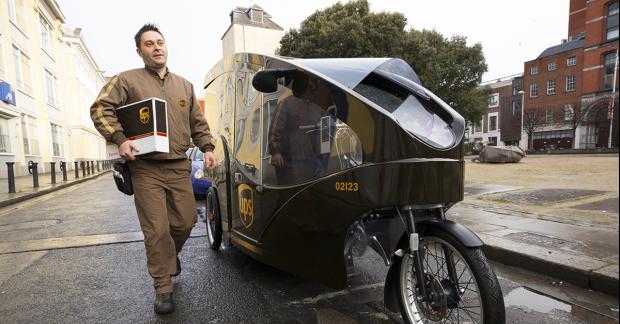The Hidden Benefits of a Sustainable Mindset
With Earth Day approaching, let’s examine the link between a culture of sustainability and one of innovation.

In some respects, it’s great news that more than half of the global population now lives in cities – a figure expected to increase to two in three people around the world by 2050.
This growth makes cities a great place to live and work and gives them a real sense of energy and vitality. But it also brings challenges of pollution, emissions and congestion, among other issues.
Ahead of Earth Day (April 22), when communities around the world will showcase their ideas for a greener and more prosperous future, it’s a good time to highlight the value of partnerships in addressing these challenges.
It’s also a timely reminder of how a sustainable mindset translates into an innovative mindset.
At UPS, we build partnerships with cities to help find solutions to their environmental and congestion challenges. Our recent work in Dublin, for example, has enabled us to replace conventional diesel vehicles with electrically assisted tricycles, which produce no emissions.
We’ve helped the city reduce pollution and congestion because the tricycles take up less road space than the diesel vehicles they’ve replaced. It’s great for the environment – and the future of Dublin. Turns out, it’s also great for UPS.
Sustainable innovations like these are real engines for growth in our business. Not only do they help us mitigate risks associated with vehicle access, they generate new economic opportunities.
We can now connect and collaborate more effectively with governments, as well as our stakeholders, employees and customers, generating a culture within the business of sustainable innovation.
In other words, these are the hidden benefits of sustainability.
Cultivating partnerships
One of the interesting aspects of our Dublin work is how it’s advanced previous progress. It goes beyond a purely operational environmental project into a new arena of bringing social engagement into the fold.
The tricycle delivery solution is built on a hub and spoke model. Packages are moved into a central location in a city, and vehicles are loaded from there.
The central location is often a container moved into the city after a pre-load early in the morning. In the case of Dublin, it was the first time we ran a local competition to create an artwork design for the container.
The container – named the Eco Hub – transcended function, and is now part of the art of the city. And that’s been a terrific success because it really brought us closer to the community.
This isn’t just about environmental sustainability. It’s also about social engagement, and the two work powerfully together.
Our efforts to replace diesel vehicles with tricycles and electrically assisted transportation started several years ago in Hamburg, Germany. And that project is still running.
We now have a number of Eco Hubs in different parts of Hamburg. In fact, there are virtually no UPS diesel vehicles in the downtown area right now. Instead, we have e-Trikes in a city center ringed with electric vehicles.
In addition to Hamburg, we’ve expanded this model across Germany – to Munich, Frankfurt Oldenburg and Offenbach. And we’re also experimenting with similar projects this year in London, Paris and elsewhere in Europe.
A transferrable model
This type of model could also produce breakthroughs in the U.S. and Asia, as the desire for more liveable spaces is universal. These won’t be copy-paste solutions, but the framework for such an approach has already proven successful.
The question for companies like UPS is one of risk. More specifically, it’s a question of converting a would-be risk, a risk of reduced access to some of our core markets, into a new opportunity.
We welcome opportunities to connect with our stakeholders, connect with the government in that area and become part of the debate about the future regulations there.
We’re striving for a culture of sustainable innovation, a framework that can help attract the best and brightest workforce to our operations around the world.
In a way, this commitment to sustainable innovation is also an engine for growth within our own ranks.
A grand plan
The Dublin and Hamburg campaigns are just pieces of a much broader sustainable urban logistics puzzle – one that includes electric vehicles, smart grids and other new technologies, innovations and problem-solving techniques that will redefine the nature of international commerce.
They all work together in a grand plan that makes the global movement of goods more efficient and sustainable. These solutions must be tailored to each individual city and their needs.
That is our future.
But not every benefit is apparent at first blush. What too often gets lost is the way in which this mindset generates a new culture of innovation across the entire business.
We see a real sense of energy now within parts of the business that are pursuing similar initiatives, and that has terrific benefits beyond individual sustainability projects.
With Earth Day fast approaching, that’s a transformation worth celebrating and doubling down on with newfound urgency. Remember that a sustainable mindset is also an innovative mindset.
What could be better for business?

